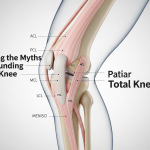Recovering from spinal surgery can feel daunting, but with the right strategy and mindset, you can significantly boost your healing process and get back to your daily routine with more strength and confidence. Whether you’ve undergone a spinal fusion, laminectomy, discectomy, or minimally invasive procedure, focused attention on your recovery can prevent complications and enhance long-term outcomes. Here are essential tips for a faster, smoother recovery after spinal surgery:
🏠 1. Set Up a Healing-Friendly Home Environment
Preparation is key. Before coming home, ensure your living space supports comfort and safety. Rearrange frequently used items (like water, medications, and phone) to waist level to avoid bending. Consider installing handrails in bathrooms or stairs, and opt for a firm, high-backed chair with armrests for comfortable sitting and standing.
🚶♂️ 2. Stay Active—But Be Gentle
Early movement is vital. While you should avoid strenuous activity, guided and gentle walking can greatly reduce postoperative complications like stiffness or blood clots. Short walks throughout the day not only improve circulation but also help regain mobility and confidence.
🧘♀️ 3. Follow a Regular Physiotherapy Routine
Physical therapy is one of the most critical components of spinal recovery. Your therapist will guide you through exercises that promote flexibility, support spinal strength, and restore posture. Be consistent and patient—small improvements build up over time and help protect your spine in the long run.
🥗 4. Nourish Your Body with Balanced Nutrition
Healing requires fuel. Incorporate foods rich in protein like lean meat, beans, dairy, and nuts to aid tissue repair. Anti-inflammatory foods such as fatty fish, berries, leafy greens, and turmeric can help reduce pain and swelling. Don’t forget hydration—water ensures nutrient delivery and supports joint flexibility.
💊 5. Manage Pain Proactively
Proper pain management allows you to complete daily tasks and exercises with less discomfort. Take prescribed pain relievers as directed, and don’t hesitate to let your healthcare team know if pain increases or affects your sleep and mobility. Uncontrolled pain can slow recovery and affect mental well-being.
🛌 6. Support Your Spine with Good Sleeping and Sitting Posture
Your sleeping posture matters. Sleep on your back or side with pillows strategically placed to maintain spinal alignment. Avoid soft or low seating that requires bending. When sitting, keep your back straight and feet flat on the floor. Regular position changes help alleviate strain on your spine.
😊 7. Stay Positive and Connected
Recovery isn’t just physical—it’s emotional too. It’s natural to feel frustrated or limited in the early weeks. Stay socially engaged through calls or short visits, practice relaxation techniques like deep breathing or light meditation, and celebrate small progress milestones.
✅ Final Thoughts
Spinal surgery recovery is a journey that requires patience, consistency, and care. By taking proactive steps—adjusting your environment, engaging in safe movement, eating a nutrient-rich diet, and keeping a positive mindset—you significantly improve your chances for a faster and more successful recovery. Your spine supports your body—now is the time to meaningfully support it in return.



